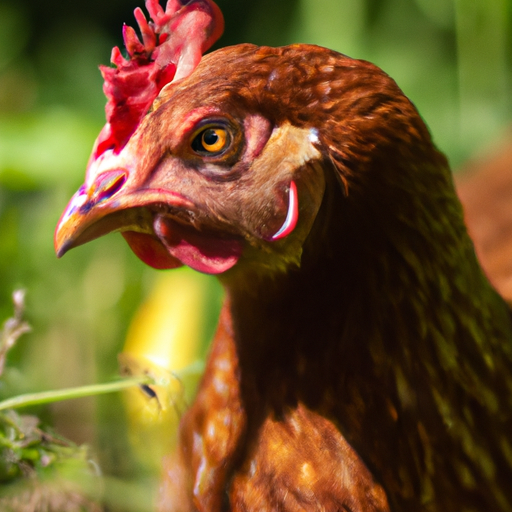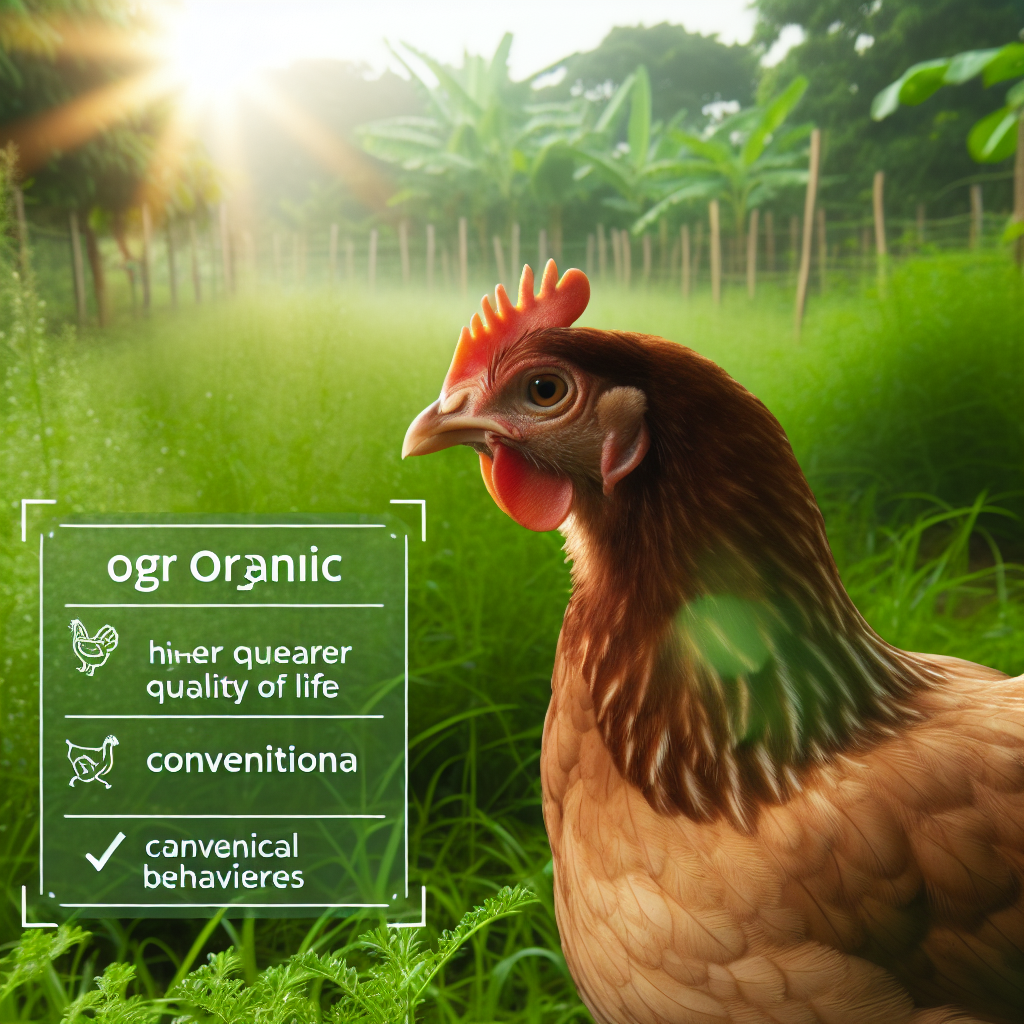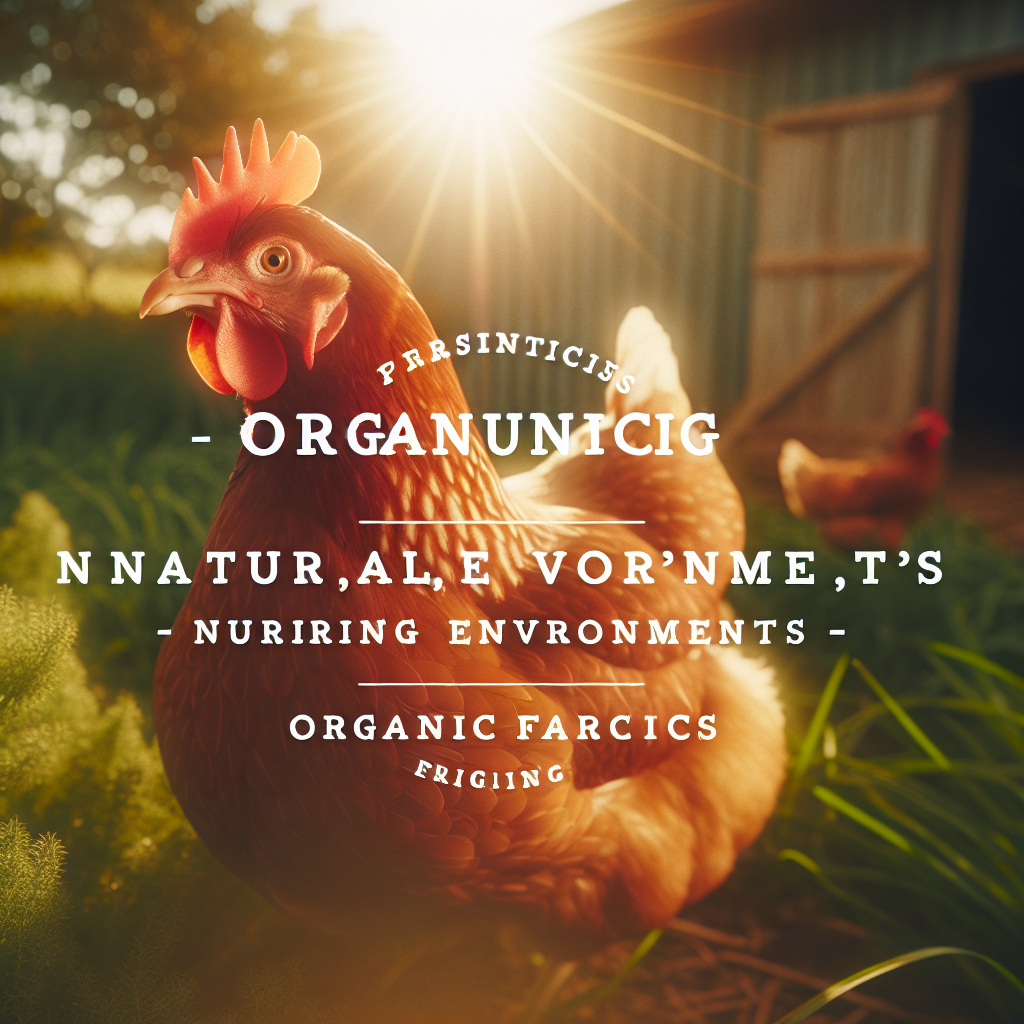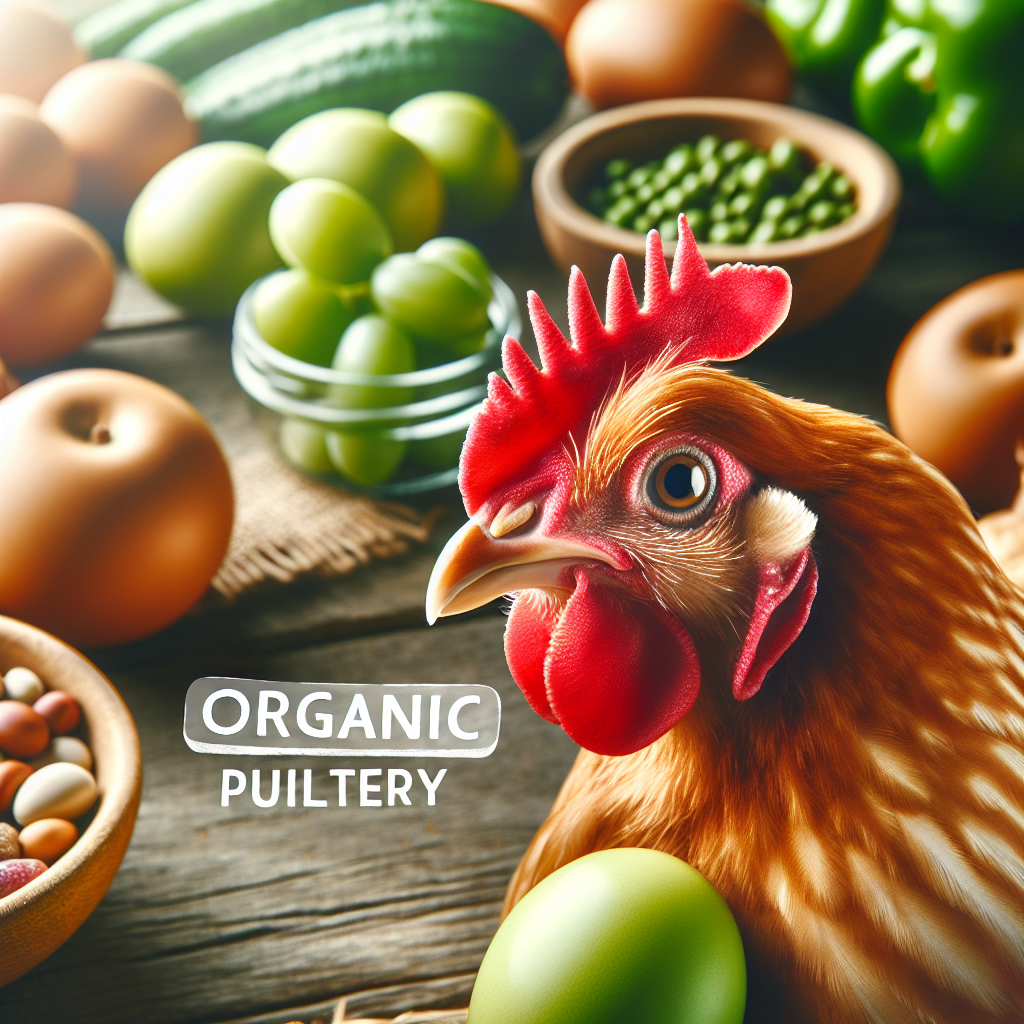If you’re interested in venturing into organic poultry farming, you may be wondering about the certifications or standards you should be aware of. It’s important to have a clear understanding of the requirements and guidelines to ensure the production of high-quality organic poultry. In this article, we will explore the various certifications and standards that you should consider, providing you with valuable insights and information to help you navigate the world of organic poultry farming.
Certifications for Organic Poultry Farming
Organic poultry farming has gained significant popularity and demand in recent years as consumers become more conscious about the quality and origins of their food. To ensure that poultry farms meet the necessary requirements and standards of organic farming, various certifications and standards have been established. These certifications not only provide credibility and assurance to consumers but also help farmers demonstrate their commitment to sustainable and humane practices. In this article, we will explore the different certifications available for organic poultry farming, understand their requirements and benefits, and discuss the challenges involved in obtaining and maintaining these certifications.
USDA Certified Organic
Overview of USDA Certification
The USDA Certified Organic label is one of the most well-known and widely recognized certifications for organic products, including poultry. Administered by the United States Department of Agriculture, this certification ensures that the poultry farming practices adhere to strict organic standards.
Requirements for Organic Poultry Farming
To achieve USDA certification, organic poultry farms must meet several requirements. These include using organic feed, prohibiting the use of antibiotics and hormones, providing access to outdoor areas for the poultry, and implementing sustainable waste management practices. Farms must also maintain detailed records and undergo regular inspections to ensure compliance with these standards.
Inspection Process
The USDA conducts on-site inspections of organic poultry farms to verify compliance with the organic standards. Inspectors assess the living conditions, feed sources, pest control, and overall management practices to determine if the farm meets the required criteria. Random testing may also be conducted for pesticide residues to ensure that the products meet organic guidelines.
Labeling Guidelines
Once a poultry farm achieves USDA certification, it is allowed to display the USDA Organic seal on its products. This seal signifies to consumers that the poultry has been raised and processed according to organic standards. The labeling guidelines include specific rules regarding the use of the seal and the representation of the organic nature of the product, ensuring transparency and accuracy in labeling.
Global Organic Standard
Introduction to Global Organic Standard
The Global Organic Standard (GOS) is an internationally recognized certification developed by the International Federation of Organic Agriculture Movements (IFOAM). It sets minimum requirements for organic agriculture and production, applicable to poultry farming as well.
Application in Poultry Farming
GOS ensures that organic poultry farming practices meet a set of global standards. These standards encompass various aspects such as feed quality, animal welfare, disease control, and environmental sustainability. By adhering to GOS, poultry farms can demonstrate their commitment to sustainable and ethical practices on a global scale.
Certification Process
The certification process for GOS follows a similar pattern to other certifications, with farms undergoing a detailed evaluation to ensure compliance. Inspections focus on the adherence to organic standards as outlined in the GOS, including inspections of poultry houses, feed sources, veterinary care, and record-keeping. Once certified, poultry farms gain recognition on an international level.
Benefits and Limitations
GOS certification offers several benefits to organic poultry farms. It allows farmers to tap into global markets that prioritize organic products. Furthermore, GOS certification assures consumers that the poultry products meet stringent international standards. However, obtaining GOS certification can be a complex and costly process, especially for smaller-scale farms, and this may pose a limitation for some farmers.
Certified Humane
Understanding Certified Humane Certification
Certified Humane is a certification program that focuses on animal welfare standards in poultry farming and other agricultural sectors. Administered by Humane Farm Animal Care (HFAC), this certification ensures that animals are treated with compassion and dignity throughout their lives.
Animal Welfare Standards
Certified Humane certification sets specific standards for the treatment of poultry, emphasizing practices that prioritize the well-being of the animals. These standards include providing adequate space, access to fresh water and natural light, and the prohibition of harmful practices such as debeaking or forced molting. Certified Humane also requires that poultry be raised without antibiotics and hormones.
Requirements for Poultry Farming
To obtain Certified Humane certification, poultry farms must meet a set of strict requirements. These requirements include meeting specific space allowances for the birds, providing appropriate shelter, access to the outdoors, and implementing handling practices that minimize stress and discomfort to the poultry. Farms must also undergo regular inspections to ensure ongoing compliance.
Inspection and Evaluation
Certified Humane conducts thorough inspections of poultry farms to assess their compliance with the animal welfare standards. Inspectors evaluate living conditions, feeding practices, handling procedures, and any potential areas of concern. The certification process involves initial inspections as well as regular follow-up visits to monitor ongoing compliance.
Animal Welfare Approved
Overview of Animal Welfare Approved Program
Animal Welfare Approved (AWA) is a certification program that focuses on ensuring the highest animal welfare standards in farming practices. Administered by the non-profit organization Animal Welfare Institute (AWI), this certification aims to improve the lives of animals and promote sustainable farming.
Standards for Poultry Farming
Animal Welfare Approved sets rigorous standards for poultry farming that go beyond basic animal welfare requirements. The standards involve providing ample space for the birds, access to pasture or outdoor areas, and the prohibition of mutilations such as beak trimming or toe removal. The program also requires adherence to strict environmental and sustainability practices.
Auditing and Certification Process
To achieve Animal Welfare Approved certification, poultry farms undergo a comprehensive auditing process. The audits assess compliance with the established standards, including evaluating living conditions, feed quality, pest and disease control, and the treatment of sick or injured birds. Farms must also provide evidence of sound environmental practices and participate in education and training programs.
Marketing and Consumer Perception
The Animal Welfare Approved certification enables farms to market their poultry products as meeting the highest animal welfare standards. This certification is recognized and respected by consumers who prioritize animal welfare and sustainable practices. The label provides assurance to the consumers that the poultry products align with their values and expectations.
Certified Naturally Grown
Introduction to Certified Naturally Grown
Certified Naturally Grown (CNG) is a grassroots certification program that focuses on organic farming practices, but with a specific emphasis on community and peer inspections. This certification provides an alternative to the USDA organic certification and is often considered more accessible for small-scale poultry farms.
Different from USDA Organic Certification
While Certified Naturally Grown shares many similarities with the USDA organic certification, there are a few key differences. Unlike the USDA certification, CNG does not involve financial fees or bureaucratic processes. Additionally, CNG emphasizes the importance of peer inspections and community involvement in ensuring compliance with organic standards.
Requirements for Organic Poultry Farming
CNG requires poultry farms to meet strict standards for organic farming practices. These include using organic feed, prohibiting the use of synthetic chemicals, ensuring adequate space for the birds, and focusing on soil fertility and biodiversity. Farms must also undergo regular peer inspections conducted by other Certified Naturally Grown farmers.
Peer Inspection and Certification
The core principle of Certified Naturally Grown is the peer inspection process. Farmers who are already certified conduct inspections of other farms to ensure compliance with organic standards. This collaborative approach fosters a sense of community and shared responsibility among farmers, while also providing credibility and assurance to consumers.
Importance of Certification
Enhanced Credibility and Market Positioning
Obtaining organic poultry farming certifications brings enhanced credibility to farmers and their products. Certification serves as an independent verification of farming practices and provides assurance to consumers that the poultry is produced according to set standards. Certified farms can use the certifications to differentiate themselves within the market and position themselves as leaders in sustainable and ethical farming.
Consumer Confidence and Trust
Certifications play a crucial role in building consumer confidence and trust. With the increasing awareness of the importance of organic and humane practices, consumers rely on certifications to validate the claims made by producers. Certifications act as a guarantee that the poultry products they purchase meet the desired ethical and sustainable standards, instilling trust in the brand and fostering long-term relationships with consumers.
Meeting Regulatory Standards
Certifications for organic poultry farming are often aligned with regulatory standards set by governmental bodies. By obtaining these certifications, farmers ensure compliance with the required regulations and avoid potential legal issues. Meeting regulatory standards through certification demonstrates a commitment to responsible farming practices and helps farmers maintain a positive relationship with regulatory authorities.
Access to Premium Markets
Certifications bring access to premium markets that prioritize organic and ethically produced poultry products. These markets often have a higher demand for certified poultry, as consumers are willing to pay a premium for products that meet their values and expectations. By obtaining certifications, farmers can tap into these premium markets and enjoy the potential for higher profits and increased market share.
Challenges in Certification
Costs and Financial Implications
Obtaining and maintaining certifications for organic poultry farming can involve significant costs. Certification fees, inspection costs, and the investments required to meet the strict standards can be financially challenging, especially for smaller-scale farms. These costs must be carefully considered and factored into the business plan to ensure the economic feasibility of certification.
Compliance with Stringent Requirements
Certifications for organic poultry farming have strict requirements that farmers must meet. These requirements can be challenging to implement and sustain, requiring changes in farming practices, infrastructure improvements, and increased management efforts. It is essential for farmers to have a clear understanding of the requirements and commit to ongoing compliance to maintain certification.
Record-Keeping and Documentation
Certifications often require extensive record-keeping and documentation to demonstrate compliance with standards. This can be a time-consuming task, requiring meticulous tracking of inputs, feed sources, veterinary treatments, and other relevant information. Farms must establish robust systems and processes to ensure accurate record-keeping and documentation, which can be burdensome, particularly for small-scale operations.
Potential Contamination and Risks
Maintaining organic standards in poultry farming involves managing potential risks and minimizing contamination. Organic feed sources must be carefully monitored to ensure they are free from genetically modified organisms (GMOs) or prohibited synthetic substances. Farms must also implement pest and disease control measures that are compatible with organic farming principles. These challenges require constant vigilance and proactive management to minimize the risks of contamination and maintain organic integrity.
Comparison of Certifications
Variations in Standards and Criteria
While all certifications mentioned in this article aim to ensure organic and ethical poultry farming practices, there are variations in their standards and criteria. Each certification sets its own specific requirements that farms must meet, which may vary in areas such as space allowances, feed sources, or handling practices. It is essential for farmers to carefully review the standards of each certification and choose the one that aligns most closely with their values and operational capabilities.
Certification Process and Rigor
Certification processes can also vary between certifications. Some certifications involve more rigorous inspections and evaluations, while others may have more streamlined processes. The certification process may also impact the time required to achieve certification, the frequency of inspections, and the ongoing monitoring and reporting requirements. Farmers should consider the time commitment and resource availability before selecting a certification program.
Costs and Annual Fees
Certification fees and annual fees can differ between certifications. Some certifications may have higher upfront costs or ongoing annual fees, while others may have lower costs. It is crucial for farmers to consider their budget and financial capabilities when choosing a certification program, ensuring that the benefits and market opportunities outweigh the costs involved.
Recognitions and Accreditation
The recognitions and accreditations associated with each certification are also important considerations. Some certifications may have broader market recognition or be recognized by specific organizations or industry associations. These recognitions can enhance market acceptance and provide additional credibility to certified farms. Farmers should evaluate the market acceptance and recognition of the certifications they are considering to make an informed decision.
Market Acceptance and Demand
The market acceptance and demand for certified organic poultry products may vary based on geographic location and target consumer base. It is important for farmers to assess the demand for certified products in their target markets and consider whether the certification they choose aligns with the preferences and expectations of their target consumers. Market research and analysis can help farmers gauge the potential market acceptance and demand for certified organic poultry products.
Conclusion
Choosing the right certification for organic poultry farming is a crucial decision that can significantly impact a farm’s credibility, market positioning, and access to premium markets. Each certification has its unique requirements, benefits, and limitations, which farmers must carefully consider based on their operational capabilities, values, and market opportunities. Certifications provide the necessary assurance to consumers, build trust, and help farms meet regulatory standards. While certification brings challenges, the long-term benefits and potential market opportunities make it a worthwhile investment for poultry farmers committed to organic and ethical practices. As the demand for organic and ethically produced poultry products continues to grow, the future trends and developments in certification programs will likely continue to adapt to meet the evolving needs of the industry.




